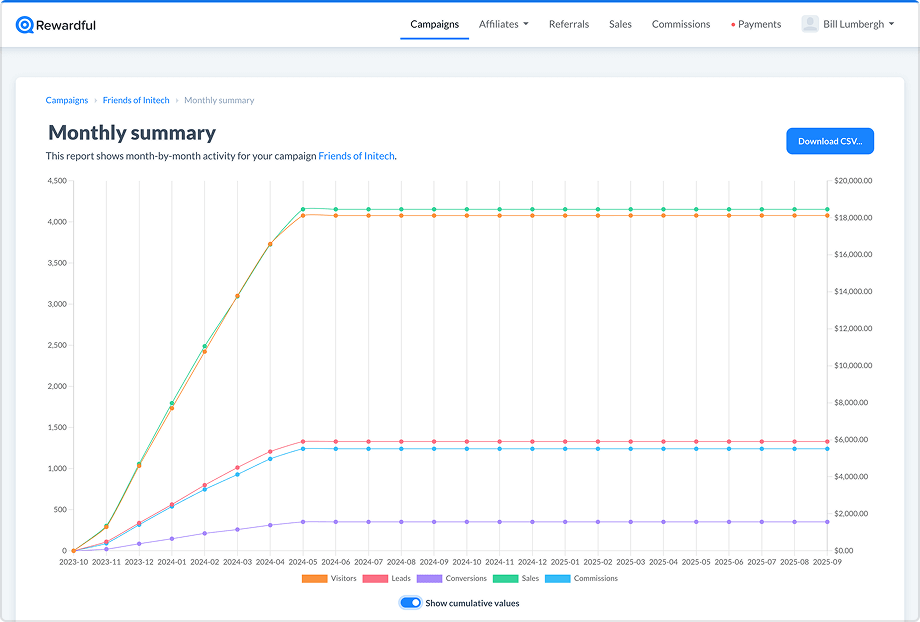Is affiliate marketing a digital fantasy or a truly effective strategy? The latter!
Affiliate marketing empowers businesses to leverage partnerships instead of raw ad dollars to grow their bottom line.
As acquiring a new customer via traditional marketing tactics becomes costly and consumers are less receptive to traditional advertising, businesses need a more sustainable strategy that yields real results. The solution is affiliate marketing!
Understanding the advantages of affiliate marketing is crucial for businesses looking to expand their reach and boost their revenue efficiently.
In this article, we will explore the affiliate marketing benefits and its pros and cons.
From its cost-effectiveness in driving significant revenue to broaden audience reach and its low-risk factor, affiliate marketing is a high ROI marketing tactic that has a lot to offer!
How Affiliate Marketing Drives Revenue to Businesses
The financial benefits of affiliate marketing are long, so we’ve divided it into different subcategories for you. It includes everything from often-overlooked advantages to risk management. Let’s dive in.
1. Affiliate Marketing Opens Doors to Revenue Growth
Now, let’s talk about revenue. If you’re looking for ways to generate more sales, affiliates lead the way.
Leverage Affiliates' Reach and Influence
Affiliates often have a loyal and engaged audience, be it through a blog, social media, or an email list. When your company partners with these affiliates, you gain access to this audience, which can significantly broaden your own customer base. This is especially true when affiliates are influencers or authority figures in their niches.
Related: Learn the different types of affiliates and how to leverage their strengths.
Tap into Recurring Revenue Streams
When your company offers subscription-based products or services (which is common in the SaaS industry), affiliates can help secure long-term customers. Since affiliates are incentivized to promote these subscriptions (often through recurring commissions), they will likely prioritize a SaaS affiliate marketing program or other subscription-based product and bring in customers with a higher lifetime value.
Discover how Pally achieved 22% MRR growth through affiliate marketing program using Rewardful.
Expand into New Markets and Locations
Affiliate marketing can be an effective way for companies to enter new markets or with reduced risk. By partnering with local or niche-specific affiliates, your business can gain valuable insights into your market and reach local audiences more effectively than a broad and costly marketing campaign.
2. Affiliate Marketing is a Low Ongoing Cost Investment
Setting up an affiliate marketing program isn't expensive, and running it isn't either – especially with Rewardful. Here’s what you should consider.
Cost-Effective Customer Acquisition
Unlike traditional advertising, where you pay upfront for the potential to reach customers (with no guarantee of sale), affiliate marketing allows you to pay only for actual sales or leads. This performance-based model ensures that you get a return on every dollar spent.
Optimized Marketing Budgets
Affiliate marketing allows you to allocate your marketing budget more efficiently. Its performance-based nature allows you to invest in other marketing channels simultaneously and use data to continually optimize where and how you spend your budget.
3. Affiliate Marketing Builds Your Brand
Are you working on brand awareness, recognition, and other brand health metrics? Affiliate marketing can free up your time.
Boost Brand Awareness and Reputation
Affiliates create content around the products they promote, whether through reviews, tutorials, or testimonials. This content not only helps to drive sales but also increases brand awareness and can enhance your company’s reputation through positive associations with respected affiliates.
Build Trust Through Third-Party Endorsements
People tend to trust recommendations from individuals over direct advertisements from companies. Affiliates, who often have dedicated followers, can lend credibility to your company’s products, resulting in higher conversion rates.
Benefit From Long-Lasting Partnerships
By building strong, long-term relationships with affiliates, you can enjoy long-term promotion of your products, ensuring that new customers continue to discover them over time.
4. Affiliate Marketing is Scalable and Flexible
Not sure whether affiliate marketing is a great fit? It’s as flexible as marketing gets, so don't worry about that.
Scale your Marketing Efforts
You can do affiliate marketing for small businesses or big names. One of the significant benefits of affiliate marketing is that it can be as big or as small as your company needs it to be. As your business grows, the affiliate program can scale with it. Adding more affiliates to the program doesn’t require a proportional increase in investment.
Flexible Commission Structures
You can pick from all types of affiliate marketing programs. You can set commissions that make sense for your margins and industry standards. You can offer higher commissions for high-performing affiliates, special promotions, or top-selling products.
Related: Learn how much commission you should pay your affiliates in this guide.
Reduce Overhead and Operational Costs
Managing an affiliate program typically requires fewer people and resources than other marketing strategies. Because affiliates are responsible for their own platforms and promotional tactics, you save on the operational costs associated with large-scale campaigns. Especially with a platform like Rewardful, things run smoothly and nearly automatically.
5. Affiliate Marketing Provides Market Intelligence
We can't skip over the value of data, and affiliate marketing brings in loads of it, especially the best affiliate software tools out there.
Gather Valuable Consumer Insights
Affiliate marketers are often close to their audiences and can provide valuable insights into consumer behavior and trends. This feedback loop can be invaluable for product development and positioning.
Collect Data and Insights for Future Strategies
Affiliate marketing can provide your business with valuable data on customer behavior, preferences, and buying patterns. This data can, in turn, inform future marketing strategies, product development, and business decisions.
6. Affiliate Marketing is Low-Risk
Still unsure whether affiliate marketing is a good choice? It’s safe to test it out: the risks are low.
Performance-Based Expenditure
Affiliate marketing’s pay-for-performance model means that you don’t pay for ad placements without a guarantee of returns. This can help significantly mitigate financial risk in marketing efforts.
Play with Diversified Marketing Channels
When your affiliates promote a product through various channels, you spread the risks. If one marketing channel underperforms, the diverse range of affiliates can ensure that there is still a steady stream of leads and sales from other channels.
7. Affiliate Marketing Enhances Organic Reach
Let’s start with an additional benefit to affiliate marketing, but a big one. Here’s how it boosts your SEO efforts.
Quality Backlinks From Affiliates
When affiliates create content about a company's products or services, they often link back to the company's website. These backlinks, particularly when from high-authority websites, can improve the company’s search engine rankings, thereby increasing organic traffic.
Related: Discover 11 types of affiliate traffic and their impact on your business.
Benefit From Content Multiplication
Affiliates create a variety of content that helps in SEO. Their blogs, reviews, and social media posts are all indexing opportunities for search engines. The more content created around a company's product, the higher the chances it will rank well in search engines.
How to Start Affiliate Marketing for Your Business
Incorporating affiliate marketing into your business strategies can be a game-changer, but it needs to be a calculated, informed decision. Here’s how to start affiliate marketing safely and make up your mind.
Join Rewardful's FREE affiliate course for a more detailed guide on how to launch, maintain, and grow your affiliate marketing program. It’s perfect for businesses that want to get started with affiliate marketing or scale up their affiliate performance.
1. Assess Your Business Goals
Define clear objectives:
- Are you looking to increase sales, improve website traffic, or raise brand awareness? How does affiliate marketing fit into this?
- Align your affiliate marketing goals with your overall business objectives.
Rewardful helps you set and monitor specific goals, from increasing sales to boosting website traffic.
2. Evaluate Your Resources
Examine your budget:
- Consider the financial aspect of starting and managing an affiliate program.
Assess staff and time resources:
- Do you have the personnel and time to manage relationships with affiliates effectively?
With Rewardful automating many aspects of affiliate management, your staff can focus on other strategic areas.
3. Research Your Industry Landscape
Study competitor programs:
- What kinds of affiliate programs are your competitors running?
- What commission structures are prevalent in your industry?
Understand your audience:
- Will your target audience respond positively to affiliate marketing strategies?
4. Consider Compliance and Regulations
Research legal implications:
- Be informed about the legal responsibilities that come with running an affiliate program.
Ensure ethical practices:
- Make sure your program promotes honest and transparent marketing practices.
5. Test and Optimize
Pilot program:
- Consider starting with a small, controlled affiliate program as a test.
Analyze and adjust:
- Regularly review the data and be willing to make adjustments.
Rewardful allows for the easy setup of a small, controlled affiliate program to test the waters and adjust as needed.
6. Evaluate the Risks and Rewards
Pros and cons:
- Weigh the potential for high returns against the possible risks and downsides.
Cost-benefit analysis:
- Conduct a thorough cost-benefit analysis considering the potential return on investment.
7. Consult with a Professional
Seek expert advice:
- Consider consulting with a professional or agency specializing in affiliate marketing to get their input based on your specific situation and industry.
8. Make a Data-Driven Decision
Use metrics and analytics:
- Make your final decision based on data and insights, not just intuition.
Set clear key performance indicators (KPIs):
- Establish specific, measurable targets that your affiliate program needs to meet.
Enjoy All the Advantages of Affiliate Marketing
The benefits of affiliate marketing are limitless, both for new businesses and established names. It is not merely a buzzword—it's a proven, practical strategy.
To navigate this terrain successfully, you need the right partner by your side. That’s where Rewardful comes into play. Our platform simplifies the complexities of starting and scaling an affiliate program, making it an attainable strategy for businesses of all sizes and ages.
Explore what Rewardful can do for you. Check out our pricing page to find the right plan for your business, and start leveraging the power of affiliate marketing today.













